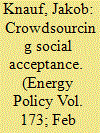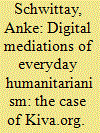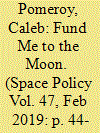| Srl | Item |
| 1 |
ID:
191179


|
|
|
|
|
| Summary/Abstract |
Citizen co-investment in wind energy projects has recently received a lot of attention among scholars and policymakers as a way to finance renewable energy projects and increase community acceptance of these projects. Citizen co-investment refers to the process by which members of the local community can financially participate in renewable energy projects prior to or shortly after construction. While previous research has often been cross-sectional and focused on the preferences of citizen-investors, this paper focuses on the perspective of project developers and asks why, when and how they offer citizens the opportunity to co-invest in wind farms. The work is based on the analysis of fourteen in-depth interviews with a sample of experienced German wind energy developers. The analysis shows that the decision to offer co-investment is driven by citizen demand and local stakeholder preferences, rather than financial needs. We shed light on how experienced developers deal with key trade-offs in terms of the timing of their offering and the choice of capital structure. As a result, we offer a number of testable propositions for further research on the nuanced relationship between citizen co-investment and social acceptance and derive recommendations for policymakers.
|
|
|
|
|
|
|
|
|
|
|
|
|
|
|
|
| 2 |
ID:
168481


|
|
|
|
|
| Summary/Abstract |
The proliferation of Web 2.0 platforms that aim to facilitate social action, often connected to international development or environmental sustainability, has contributed to the ongoing popularisation of development. In this article, I argue that it has resulted in the digitally-enabled constitution of everyday humanitarians, who are everyday people supportive of poverty alleviation. Kiva.org, a US-based online microlending platform that invites everyday humanitarians to make US$25 loans to Kiva entrepreneurs around the world, is a prime site to study these processes. I show how Kiva cultivates supporters through the mediated production of affective investments, which are financial, social and emotional commitments to distant others. This happens through the design of an affective architecture which in turn generates financial and spatial mediations. While these result in microloans and attendant sentiments of affinity, they also lead to financial clicktivism and connections that obscures the asymmetries and riskscapes resulting from Kiva’s microlending work.
|
|
|
|
|
|
|
|
|
|
|
|
|
|
|
|
| 3 |
ID:
166556


|
|
|
|
|
| Summary/Abstract |
Despite the emergence of the green bond market, the Energy Service Company (ESCO) model and green investment banks, the opportunities which the world's capital markets present to increase the pool of potential investors and reduce project financing costs for renewable, energy efficient and low carbon assets remain under-exploited. This has been a persistent concern for policy-makers. We review the appeal of this sector to different classes of investor and assess the successes and failures of several innovative products including securitisations, yieldcos, green bonds, green investment banks and crowdfunding. We analyse the experiences with these products and suggest that policy needs to recognise how fiscal initiatives can leverage their inherent appeal.
|
|
|
|
|
|
|
|
|
|
|
|
|
|
|
|
| 4 |
ID:
169296


|
|
|
|
|
| Summary/Abstract |
The likes of Elon Musk and Jeff Bezos now occupy the headlines once dominated by Apollo and Soyuz. Described as New Space versus Old Space, debate surrounds the emerging commercial space industry and the role of nontraditional actors in the evolving contemporary space exploration environment. This article enters this debate by adopting a sociological approach to investigate the role of crowdfunding in financing space exploration today. We interviewed crowdfunded space project creators in disparate locations, from Moscow to Silicon Valley, who attracted capital ranging from $200 to over $1 million. We attempt to uncover their experiences using this distinctly social financing mechanism and find that although crowdfunding is unlikely to solve all of today's research funding conundrums, it does appear to increase access to space in unique ways. We argue, however, that the most interesting dynamic of this phenomenon is the way in which crowdfunding contributes to an increasingly democratic exploration environment and how this might impact space science research and the power structures of the space industry. This article concludes by considering possible implications of this trend and derives practical suggestions for both policymakers and individuals who may be considering the use of crowdfunding to finance space science research and exploration projects.
|
|
|
|
|
|
|
|
|
|
|
|
|
|
|
|
| 5 |
ID:
138224


|
|
|
|
|
| Summary/Abstract |
Public engagement (PE) initiatives can lead to a long term public support of science. However most of the real impact of PE initiatives within the context of long-term science policy is not completely understood. An examination of the National Aeronautics and Space Administration's (NASA) and European Space Agency's (ESA) Hubble Space Telescope, James Webb Space Telescope, and NASA's International Sun/Earth Explorer 3 reveal how large grassroots movements led by citizen scientists and space aficionados can have profound effects on public policy. We explore the role and relevance of public grassroots movements in the policy of space astronomy initiatives, present some recent cases which illustrate policy decisions involving broader interest groups, and consider new avenues of PE including crowdfunding and crowdsourcing.
|
|
|
|
|
|
|
|
|
|
|
|
|
|
|
|